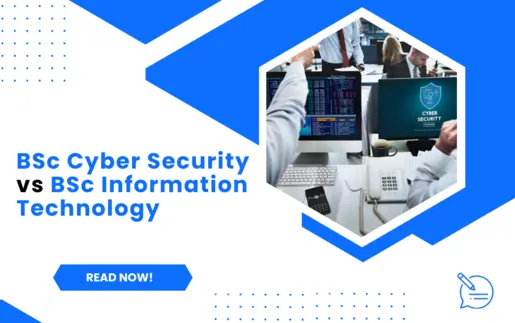Guardians of the Digital Realm: An In-Depth Overview of Cyber Security Course
Today, the cyber attackers are equipped with sophisticated technologies. Therefore, there is a high risk of hacks and security breaches. For this reason, the importance of cyber security course cannot be overstated. We all understand that threats to digital lives are increasing due to technological advancements. To combat these threats and protect our sensitive information, students need to be admitted to cyber security program.

This blog will give an in-depth overview of BSC cyber security fees and scope . You’ll learn why it is crucial to learn cybersecurity, the difference between hacking and ethical hacking, and the history of hacking and cybersecurity.
What is Cyber Security?
Cyber Security course is the practice of protecting computer systems and data from theft, damage or unauthorized access. It encompasses various measures and technologies to safeguard digital information and infrastructure. Cyber security professionals are responsible for identifying vulnerabilities, implementing security solutions and monitoring systems to prevent and respond to cyber threats.
Why pursue a cyber security course?
Today, the data is more valuable than physical assets. Therefore, students must pursue cyber security program to learn how to secure their digital information.
Career Opportunities
There is a growing need for cyber security expertise but a dearth of qualified candidates to fill such positions. This means there will be many work opportunities at competitive pay levels.
Ethical Hacking
If you're interested in finding and fixing security holes rather than taking advantage of them, you can choose a career in ethical hacking, which requires cyber security knowledge.
Personal Security
Anyone might become a victim of cyber-attacks. Protecting one's identity and private data online is easier with cyber security knowledge.
Difference Between Hacking and Ethical Hacking
Though the terms are sometimes used interchangeably, there is a clear difference between hacking and ethical hacking. "Hacking" is often used to describe the illegal use of computers, networks, or data. In this sense, hackers do bad things, such as steal private data or cause service outages.
On the other hand, "Ethical Hacking" involves purposefully exploring a target system, network, or application for security flaws. White-hat hackers, also known as ethical hackers, do these actions with the approval and knowledge of the system's owner to strengthen the system's defences.
History of Hacking and Cyber Security
The development of hacking and cyber security is an intriguing look at how technology has become more vulnerable. Although early hacking was motivated mostly by exploration and curiosity, evil intent soon emerged, ushering in a darker era for the practice.
1960s-1970s: Early hackers at MIT and Bell Labs just wanted to learn more about the possibilities of computers, so they set out to do just that.
1980s: The emergence of the first computer worms and viruses marked the start of modern cyber dangers. People began to link the word "hacker" with criminal behaviour as time passed.
1990s: As the internet grew, so did the prevalence of cybercrime. The necessity for cyber security was brought to light by high-profile instances like the Morris Worm and the Kevin Mitnick trial.
2000s: There was a rise in the sophistication of cyber assaults against governmental institutions, corporations, and private citizens. As a result of the growing dangers, the discipline of ethical hacking developed.
2010s: Famous hacks (Target, Equifax) have shown how susceptible digital systems are to attack. Organizations everywhere have elevated cyber security to their highest priority list.
Applications of Cyber Security
Cyber security plays a vital role in various domains:
1. Business Security:
Protecting sensitive business data, customer information, and trade secrets.
2. Government and Defense:
Safeguarding national security by defending critical infrastructure and military systems.
3. Healthcare:
Ensuring the privacy of patient records and securing medical devices.
4. Banking and Finance:
Preventing fraud, securing transactions, and safeguarding financial assets.
5. Internet of Things (IoT):
Securing smart devices and appliances connected to the internet.
Recommended Audience
BSc cyber security scope is vast. It is recommended for:
IT Professionals: Seeking to specialize in security.
Students: Interested in a future-proof career.
Managers: Responsible for IT or security departments.
Entrepreneurs: Protecting their business ventures.
Individuals: Concerned about personal online safety.
Prerequisites
Before diving into a cyber security course, it's beneficial to have a foundation in:
Computer Basics: Understanding of hardware, software, and operating systems.
Networking: Familiarity with network protocols and configurations.
Programming: Basic coding skills in languages like Python or C++.
Operating Systems: Knowledge of Windows, Linux, or macOS.
To sum up, cyber security is more than a job; it's an essential part of our everyday digital existence. Experts in cyber security are charged with safeguarding our data, personal information, and online identities in the digital world. A working knowledge of cyber security is crucial in today's digital world, whether your goal is to launch a career in the industry or just to protect yourself while using the internet. With the correct training, you can protect the internet from cybercriminals and guarantee its continued safety for future generations. If you want to start your career by pursuing cyber security course, you can take admissions at CGC Jhanjeri. So, what are you waiting for? Apply now!



















